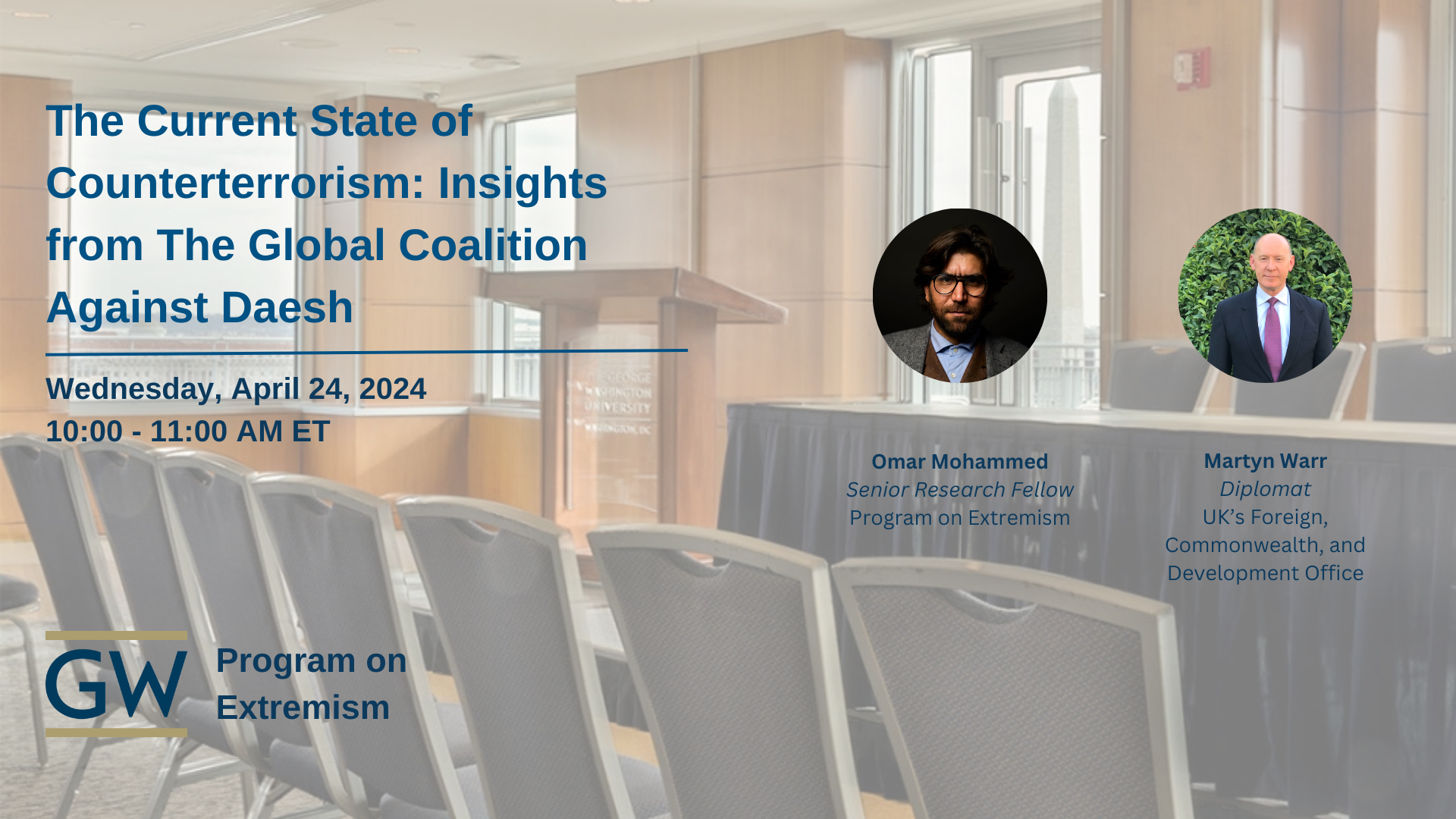The Current State of Counterterrorism: Insights from The Global Coalition Against Daesh

Recent attacks claimed by ISIS-K in Iran and Russia have underscored the imperative to re-evaluate the threat posed by the Islamic State and its affiliates. In order to do so, the Program on Extremism at The George Washington University was honored to host Martyn Warr OBE, Head of the Counter Daesh Communications Cell in the UK's Foreign, Commonwealth, and Development Office, on behalf of the Global Coalition to Defeat Daesh. Mr. Warr assessed the current counterterrorism landscape, emphasizing recent developments and the state of the Global Coalition's efforts to counter the threats posed by Daesh and its affiliates. The event was moderated by Program on Extremism Senior Fellow Omar Mohammed.
To discuss these dynamics, the Program on Extremism hosted a virtual event on April 24, 2024, at 10 am EST.
On April 24, 2024, the Program on Extremism at The George Washington University hosted a virtual event titled “The Current State of Counterterrorism: Insights from the Global Coalition Against Daesh.” The event featured Martyn Warr, Head of the Counter Daesh Communications Cell in the United Kingdom’s Foreign, Commonwealth, and Development Office, on behalf of the Global Coalition to Defeat Daesh (“The Coalition”) and was moderated by Program on Extremism Senior Fellow Omar Mohammed.
The event examined the current threat posed by the Islamic State and its affiliates in the aftermath of recent ISIS-K attacks in Iran and Russia. Mr. Warr and Dr. Mohammed discussed the Coalition’s contribution to the international counterterrorism effort to defeat Daesh, which includes regaining control over Daesh controlled territory in Iraq, preventing Daesh attacks, disrupting its propaganda operations, and supporting the counter terrorism efforts of Iraqi and Syrian forces.
Mr. Warr stated that going forward the Coalition must continue its support for Iraqi forces in order to sustain a stable security environment. A hasty departure by the Coalition from Iraq could allow Daesh to reemerge thereby reversing recent security gains in the country. In Syria, Mr. Warr noted that although Daesh does not hold territory, it retains a considerable influence and the potential to occupy territory in certain areas of the country. Mr. Warr separately provided an overview of the dire security situation in the African Sahel resulting from the emergence of Islamic State affiliates in that region. Mr. Warr called for greater government investment and support for the Coalition so that it may continue its critical role in combating Daesh globally.
In response to an audience question about the Coalition’s response to the current varied global threat posed by ISIS, Mr. Warr explained that ISIS’s use of technology and propaganda enables it to project threats to regions thousands of miles from its physical strongholds. In response, the Coalition is collaborating with more countries than ever, including some that are not formal members of the Coalition. In the African theater specifically, Mr. Warr explained that Daesh has been particularly successful in using propaganda to exploit the conditions of poverty to recruit new members. To counter this the Coalition should seize opportunities to build the capacity of local communities and their security forces to oppose ISIS and prevent large swathes of territory from coming under ISIS control. In response to another audience question inquiring how the current Israeli-Hamas conflict would affect ISIS and other Islamist extremist groups, Mr. Warr predicted that extremist groups y would put aside any intergroup rivalries to leverage the war and associated “underpinning grievances” to radicalize and recruit new members.
In response to a question from Dr. Mohammed about the types of counter-recruitment techniques the Coalition uses to combat ISIS, Mr. Warr explained that the Coalition utilizes “counternarratives” to respond to propaganda threats. Specifically, the Coalition first seeks to understand ISIS propaganda, how it is disseminated and intended to shape its targets’ attitudes and behaviors. The Coalition team then crafts a counternarrative campaigns that aims to compete for the same targets’ attention and ultimately influence their attitude and behavior. Mr. Warr separately emphasized the importance of rehabilitating and reintegrating imprisoned ISIS members. Members that are successfully deradicalized can demonstrate the possibilities of rehabilitation and also provide a powerful counter to the propaganda appeals of ISIS.
On the matter of ISIS’s presence in Africa, Mr. Warr explained that the Coalition sought to take a more specific and particular approach to working with each state’s government partners and local communities in order to prevent ISIS from gaining influence. Mr. Warr proposed using such specific success stories as counternarratives to project and promote the Coalition’s ability to counter ISIS. Hopefully these individual examples would create a domino effect of successive communities rejecting ISIS throughout a region. With respect to the future of the Coalition and the international community’s fight against ISIS going forward, Mr. Warr emphasized the importance of marshalling financial resources and continuing to facilitate collaboration between local governments and the broader international community, including other governments, multilateral coalitions, and NGOs in order to improve the Coalition’s ability to proactively anticipate and prepare for future threats.
Dr. Mohammed and Mr. Warr also discussed how collaboration between academic researchers and the Coalition can positively contribute to the continued fight against the Islamic State. Mr. Warr stressed the importance of widespread debate about counterterrorism, security, and development policy in the academic community. He added that the ultimate demise of Daesh will require a “whole-of-community” approach, with collaboration between non-government entities, the academic community, and government agencies.
Dr. Mohammed concluded the event by announcing a special episode of the Taking Apart Terror podcast, produced in collaboration between the Program on Extremism and the Global Coalition to Defeat Daesh. The episode focuses on the experiences of survivors of ISIS attacks in the UK, Australia, Iraq, and the Democratic Republic of the Congo. The episode was written by Dr. Haroro Ingram and hosted by Dr. Mohammed.

